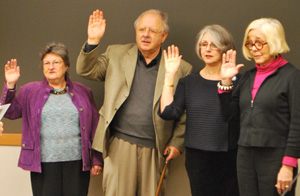Ann Arbor Library Frames Tech Issues
Ann Arbor District Library board meeting (March 21, 2011): Monday’s meeting of the AADL board included an animated discussion about how digital books are transforming the publishing industry, and the impact those changes are having on public libraries.
The avatar for Eli Neiburger – or click the photo to see how he looks in real life. Neiburger has been named by Library Journal as one of its 2011 Movers & Shakers.
The topic stemmed from a report by AADL director Josie Parker, who described her experience at a recent working group meeting for the Digital Public Library of America. At that invitation-only event, Parker framed the discussion among industry leaders regarding the future of public access to information, from the perspective of public libraries.
It’s an issue highlighted by the decision of two major publishers – Macmillan and Simon & Schuster – not to sell eBooks to public libraries, making more than 25% of the eBook market unavailable to library patrons. More recently, HarperCollins announced restrictions on how libraries can circulate eBooks that it publishes.
Eli Neiburger, AADL’s associate director of IT and product development, gave a talk on the impact of eBooks at a national summit last fall called “ebooks: Libraries at the Tipping Point” – his presentation can be viewed online. At Monday’s meeting, Parker congratulated him for being named by Library Journal as one of its 2011 Movers & Shakers, in the category of tech leaders.
In another technology-related update, Parker told the board she’s been invited to serve on the Bill & Melinda Gates Foundation‘s public access technology benchmarks program. That workgroup will be developing benchmarks that libraries can use to determine the kind of technology infrastructure they need to deliver services to their communities.
Parker also briefed the board on new standards imposed by the Library of Michigan, which changed how public libraries qualify for state aid. Those standards – originally proposed as rules – are the subject of a lawsuit against the state library, filed by the Herrick District Library in Holland. The AADL has filed an amicus curiae – or “friend of the court” – brief in support of the Herrick library’s position, which charges that the state library has no authority to set these rules, and is taking away local control from district libraries.
Aside from updates made by Parker, the board dispatched with the rest of its business quickly. No one spoke during the time available for public commentary. [Full Story]




